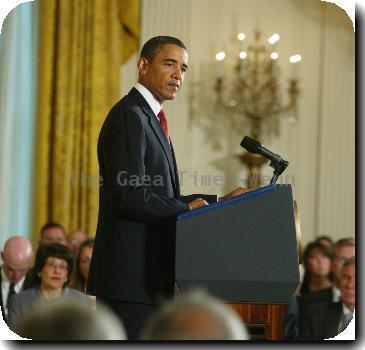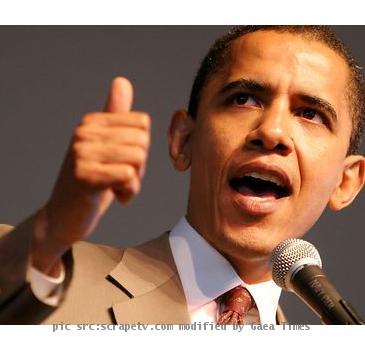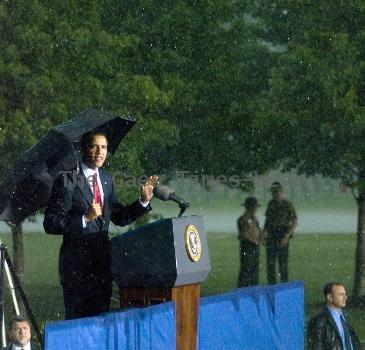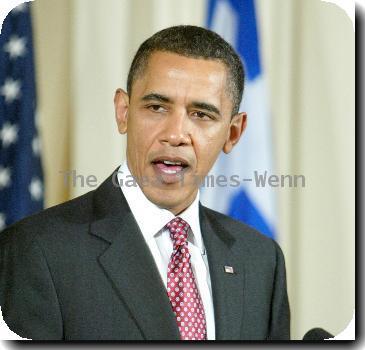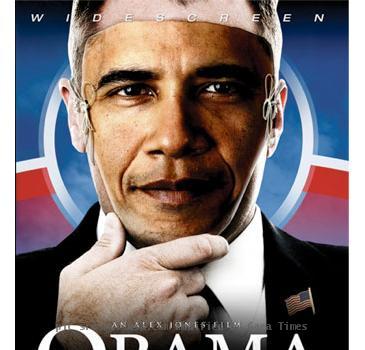Blago jury deadlocks on all but 1 charge against former governor; prosecutors plan retrial
By Michael Tarm, APTuesday, August 17, 2010
Jury deadlocks on all but 1 charge against Blago
CHICAGO — A federal jury deadlocked Tuesday on all but one of 24 charges against former Illinois Gov. Rod Blagojevich, including the most explosive of all — that he tried to sell an appointment to President Barack Obama’s old Senate seat. Blagojevich was convicted on a single, less serious count of lying to federal agents.
Prosecutors pledged to retry the case as soon as possible.
“This jury shows you that the government threw everything but the kitchen sink at me,” Blagojevich said outside court. “They could not prove I did anything wrong — except for one nebulous charge from five years ago.”
But three jurors said the panel was deadlocked 11-1 in favor of convicting Blagojevich on more serious charges. Two of those jurors said those counts included trying to auction off the Senate seat.
Juror Erik Sarnello of Itasca, Ill., said one woman on the jury “just didn’t see what we all saw.” Sarnello said the counts involving the Senate seat were “the most obvious.”
Other jurors tried to persuade the holdout to reconsider, but “at a certain point, there was no changing,” he said. Said fellow juror Stephen Wlodek, “In the end, based on what happened today, the people of the state just did not have justice served.”
That so many jurors were convinced of Blagojevich’s guilt bodes well for prosecutors, said Joel Levin, a former federal prosecutor in Chicago who helped win a conviction of former Illinois Gov. George Ryan on corruption charges.
“At the end of the day it signals very strongly they will get a conviction next time,” Levin said. “It sounds like the case was lost in jury selection.”
Blagojevich — known for his showmanlike, over-the-top personality — showed no emotion as the verdict was read. Before jurors came in, he sat with his hands folded, looking down and picking nervously at his fingernails. He and his lawyer said they would appeal the conviction.
The verdict came on the 14th day of deliberations, ending an 11-week trial during which a foul-mouthed Blagojevich was heard on secret FBI wiretap tapes saying the power to name a senator was “(expletive) golden” and that he wasn’t going to give it up “for (expletive) nothing.”
The count on which Blagojevich was convicted included accusations that he lied to federal agents when he said he did not track campaign contributions. But the jury did not convict him on a related allegation that he kept a “firewall” between political campaigns and government work. It carries a sentence of up to five years in prison. Some of the more serious charges, such as racketeering, carried up to a 20-year penalty.
Blagojevich vowed to appeal the single conviction and declared he was a victim of persecution by the federal government. He told reporters that he wants the “people of Illinois to know that I did not lie to the FBI.”
It had been clear jurors were struggling with the case. Last week, they told Judge James B. Zagel they had reached a unanimous decision on just two counts and had not even considered 11 others.
Jury foreman James Matsumoto said while he voted to convict Blagojevich and his brother on all counts, he knew from the first day of deliberations that the jury would have trouble coming to unanimous agreement.
“It was a very arduous process,” Matsumoto said. “Some people looked at it and said, ‘He was only talking.’”
Both Matsumoto and Sarnello bemoaned the complex case presented by prosecutors, and Matsumoto urged prosecutors to simplify their case during the retrial.
Jurors appeared more haggard Tuesday than during the trial. As they filed into the courtroom, many appeared nervous, some looking down at the floor as Zagel read the verdict form to himself, then passed it to a bailiff. They had asked earlier Tuesday for advice on filling out their verdict forms and a copy of the oath they took before deliberating.
The former governor’s brother and co-defendant, Robert Blagojevich, said the jury’s conclusion showed he’s been “an innocent target of the federal government” all along.
“I feel strong. I feel confident. I don’t feel in any way deterred. I’ve done nothing wrong,” he told reporters at the courthouse. “I’ve got ultimate confidence in my acquittal.”
Defense attorneys had argued that Rod Blagojevich was a big talker, but never committed a crime. They took a huge gamble by deciding not to call any witnesses — including Blagojevich, who had repeatedly promised to take the stand.
Zagel set a hearing for Aug. 26 to decide manner and timing of the retrial, which could unfold at the height of the fall campaign.
When Zagel said he would give prosecutors time to decide whether to take Blagojevich to court again, prosecutor Reid Schar spoke up instantly — almost appearing to cut the judge off.
“It is absolutely our intention to retry this,” the normally reserved prosecutor said sternly, looking momentarily agitated.
While Blagojevich showed little emotion, his wife Patti seemed close to tears — shutting her eyes before the verdict and exhaling slowly to keep her composure. Just before the verdict, she pulled out two knitting needles and began working on what appeared to be a sweater.
For most of the trial, the 53-year-old Blagojevich, a perpetual campaigner and recent reality TV star, seemed cheerful. He often glided through the courthouse smiling and chatting with passers-by.
His demeanor was in contrast to his older brother, a Nashville, Tenn., businessman, who was often subdued and walked to court alone.
As he left the courthouse, Blagojevich got a huge round of applause from the courthouse crowd.
Leota Johnson, 72, of Chicago, chanted “Rod is free!” Johnson said she supports Blagojevich because she isn’t convinced he did anything wrong and that pay-for-play is Chicago politics as usual.
During the trial, prosecutors relied heavily on the FBI wiretaps, in which Blagojevich spewed profanity and speculated about getting a Cabinet job in exchange for the Senate appointment. Several witnesses also testified that they felt pressured to donate money to Blagojevich’s campaign in exchange for favorable state action.
“I found it offensive,” Matsumoto said. “When he spends his time not doing the things a governor should do, and talks about people as if we’re nothing more than someone that should vote for him or contribute to his campaign fund, it’s very troubling.”
Blagojevich’s trial was another chapter in Illinois’ history of crooked politics. His predecessor, George Ryan, was convicted of racketeering in 2006 and is serving a 6½-year-sentence.
Some had feared the trial could harm Democrats as the party geared up for tough elections this fall.
Blagojevich’s attorneys had plastered Washington and Illinois with subpoenas — including White House chief of staff Rahm Emanuel and Senate Majority Leader Harry Reid — but by the end of the trial, none of them had testified, sparing Democrats any potentially embarrassing testimony.
Associated Press writers Karen Hawkins, Serena Dai, Deanna Bellandi, Carla K. Johnson and Caryn Rousseau contributed to this report.
Tags: Barack Obama, Blago, Chicago, Illinois, North America, Political Corruption, Political Issues, Racketeering, Rod blagojevich, United States
